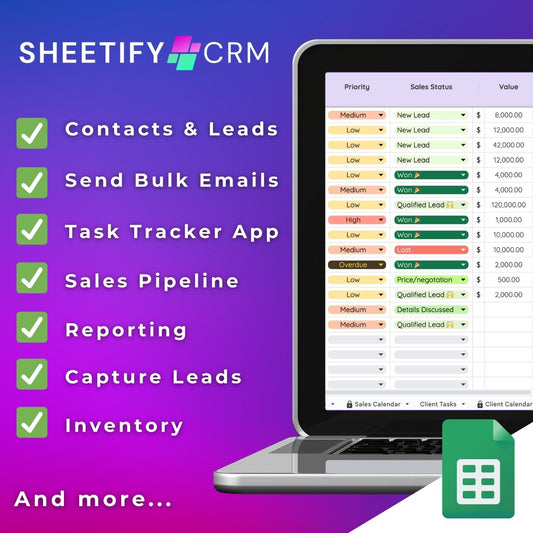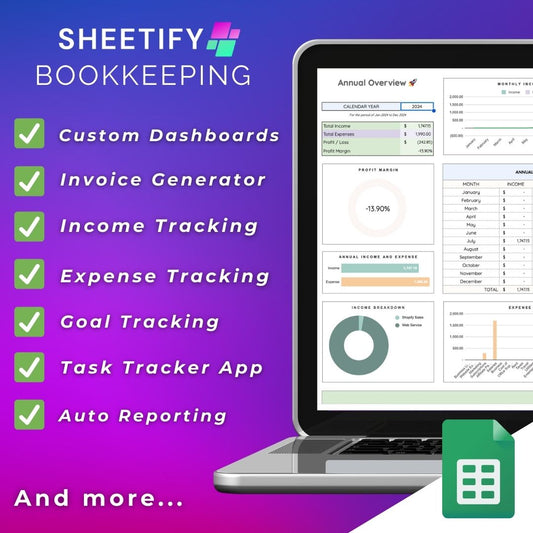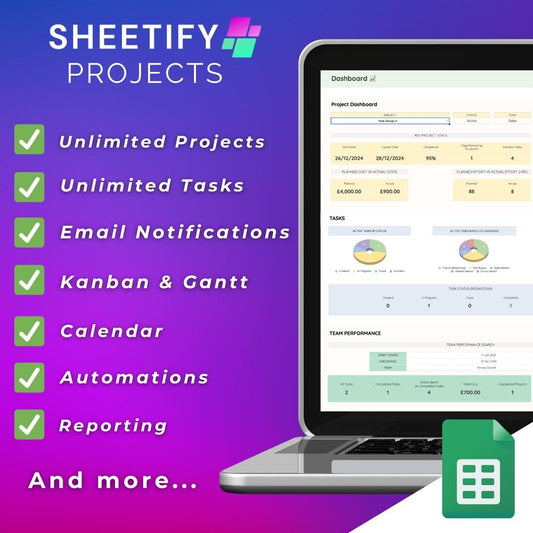
Google Sheets vs Excel As a CRM | Which Is Best For You?
Share
Google Sheets vs Excel for CRM: Which should you use?
Are you looking to use a spreadsheet tool to manage and streamline your CRM activities but need help deciding between Google Sheets vs Excel?
Spreadsheet tools like Google Sheets and Excel were designed to organize, analyze, and manipulate various data types.
Therefore, Google Sheets and Excel can effectively be used as CRM tools.
But the question remains: Which is the best CRM for you? Google Sheets vs Excel?
- Google Sheets is the best CRM solution for smaller teams or startups, prioritizing accessibility and real-time collaboration.
- Excel is more suited for teams with larger datasets that require more robust analysis and handling.
While Excel is typically considered the more advanced option for CRM activities, Google Sheets can be a more versatile CRM solution than Excel.…..if you use Sheetify CRM.
Google Sheets vs Excel as a CRM: Side-by-side comparison

We know that both Google Sheets and Excel offer robust features that promise to organize, analyze, and manage your customer data effectively.
But when it comes to selecting the right one for your unique needs, the decision can be anything but straightforward!
Ultimately, choosing between Google Sheets vs Excel as a CRM system depends on various factors such as your business needs, budget, datasets, and team size.
Let’s take a closer look at what each platform has to offer:
1. Accessibility and collaboration
Google Sheets is a web-based application within Google Workspace, meaning you can access it anywhere worldwide (as long as you have an Internet connection).
All team members can access and work on the same document simultaneously, with changes automatically saved by Google Sheets in real-time.
Excel has a desktop and web application (within Microsoft 365), allowing for online and offline use.
The desktop version doesn’t support real-time collaboration, and although collaboration is more seamless in the web version, it’s not as intuitive as Google Sheets.
However, the web version does have auto-save and version history features.
Ensuring your entire team is on the same page is when managing your CRM activities is essential.
Therefore, Google Sheets is undoubtedly the better option here!
2. Pricing
As a Google product, Google Sheets is completely free to use within Google Workspace.
If you’re after more storage and more advanced features like Gemini AI, you can also pay a monthly fee (ranging in price from $6-18 per user).
The web version of Excel (available within Microsoft 365) is also free, with limited features.
Similarly to Google Workspace, you can pay a monthly Microsoft 365 subscription fee for paid plans. These pricing plans range in price from $6-22 per user.
To use the desktop version of Excel, you must purchase the software as part of Microsoft Office for a one-time fee of $149.
As you can see, both products offer similar free and paid pricing plans.
3. Features and functionality
In terms of features and functionalities, both tools are sufficient for basic data manipulation and calculations with help from built-in formulas, graphs, and data validation rules.
There are also plenty of downloadable free and paid Excel and Google Sheets CRM templates available online.
Google Sheets can be integrated with other Google Apps, and additional tools like the Google App Marketplace and Apps Script can also be utilized to enhance functionality.
Additionally, you can download the Sheetify CRM template to track your customer-related activities without the headaches of building your own automations and app scripts.
Excel, on the other hand, offers more advanced features in terms of data analysis, visualizations, and calculations.
And like Google Sheets, you can integrate Excel with other Microsoft products and add-ons to add specific CRM functionality.
Excel might be the preferred choice for businesses needing advanced analysis, reporting, and data manipulation (unless you use Sheetify CRM).
4. Customization and scalability
As mentioned previously, Google Sheets is highly customizable, as you can add scripts to your spreadsheet using Google Apps Script.
Basically, if you know your way around Google Sheets, the customizations are limitless!
However, there are some limitations on size and complexity. For example, large datasets can affect performance.
Excel also offers a high level of customization, with VBA scripting for automation.
As a general rule of thumb, Excel handles larger datasets better than Google Sheets (especially in the desktop version).
For scalability and handling complex, large datasets with custom functionality, Excel is the more powerful option.
However, if you want to create a highly personalized CRM solution within Google Sheets, I highly recommend using Sheetify’s customizable CRM package.
5. Ease of use
While both Google Sheets and Excel have user-friendly interfaces, Google Sheets has the slight advantage here with its minimalistic, streamlined interface.
Google Sheets is also easier to use for beginners.
However, if you already use Microsoft Office products, you’ll likely find Excel easier to navigate.
Which should I pick for CRM? Google Sheets vs Excel?

For smaller businesses or startups focusing on accessibility, real-time collaboration, and ease of use, Google Sheets may be the best fit.
However, for larger teams (or those with complex CRM needs) that require more robust data handling and detailed analysis, Excel might be the better choice.
It’s also important to consider whether you’re already familiar with other Google or Microsoft products, as this could sway your decision.
It's also worth noting that dedicated CRM software might be a worthwhile investment for long-term, scalable CRM solutions.
These standalone CRM platforms typically offer integrations, automation, and customer support features that neither Google Sheets nor Excel can fully match.
However, if you’re looking for a versatile and easy-to-use Google Sheets CRM system for your small business that’s affordable and functional, you must try Sheetify CRM.
Sheetify CRM can completely replace these dedicated CRM software!
What is Sheetify Google Sheets CRM?

If you're searching for a user-friendly and affordable CRM system that seamlessly integrates with Google Sheets, Sheetify CRM is certainly worth exploring!
Designed exclusively for Google Sheets users, Sheetify CRM helps small and micro businesses manage their entire CRM activities without leaving Google Workspace.
From contacts to leads, sales, emails, tasks, inventory, invoices, and beyond, you can organize and track your customer-related activities within one Google Sheets spreadsheet.
Sheetify CRM caters to both free users and subscribers of Google Workspace.
With a one-time payment of $67, you and your team can access all the existing Sheetify features plus free updates for life. It's a one-stop solution for a CRM that lasts a lifetime.
And guess what? Sheetify CRM doesn’t have any hidden fees or recurring charges.
Plus, Sheetify has built-in Apps Scripts, formulas, automations, and data validation rules, so you don’t have to do any heavy lifting yourself.
Interested in learning more about how this Google Workspace CRM works? Dive into my detailed Sheetify CRM tutorial here.
If you’re thinking about using Google Sheets as a CRM, I highly recommend downloading this versatile and easy-to-use Google Sheets CRM.
Trust me, you won’t regret it.






